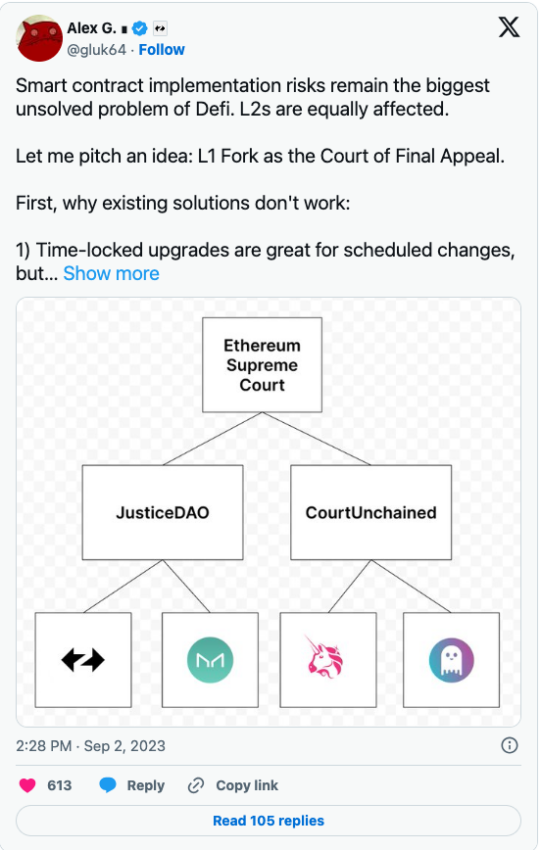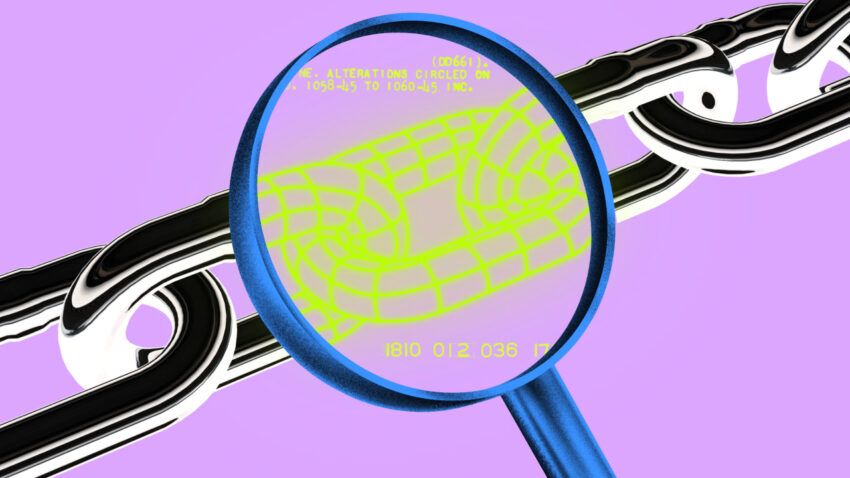The notion of an “Ethereum Supreme Court” to resolve smart contract disputes is garnering attention in the cryptocurrency industry.
Proposed by Matter Labs co-founder Alex Gluchowski, the idea aims to offer a hierarchical, on-chain judicial system that could serve as an ultimate authority within the Ethereum network, a decentralized platform that enables smart contracts and distributed applications.
Proposal for Court to Integrate Into Ethereum Protocols
Gluchowski’s vision is audacious. Contrary to existing decentralized justice platforms like Kleros, which employ a jury-selection mechanism to arrive at decisions, the Ethereum Supreme Court plans on establishing a direct integration with the Ethereum protocols.
It would function as an embedded governance system, running on-chain and creating a robust shield against external interference.
Read our guide to understanding smart contracts here.
Gluchowski puts forth an innovative idea, initially introducing a multi-tiered court system. Interestingly enough, this structure would reflect the hierarchical structures prevalent in traditional legal systems. Moving seamlessly to the next point, it is under this proposed system that each Ethereum protocol would be governed by its own specialized court.
In the event of disputes, they could then be escalated through various appellate levels. This process continues until, ultimately, the dispute reaches the Supreme Court for a definitive, final decision.
Gluchowski suggests a multi-tiered court system that would parallel the hierarchical structures of traditional legal systems. Each Ethereum protocol would be governed by its specific court. Disputes could escalate through various appellate levels until reaching the Supreme Court for a final decision.

Notably, a unique smart contract would execute each stage, maintaining the integrity of Ethereum’s decentralized architecture.
One of the remarkable aspects of this conceptual framework is its potential deterrence mechanism. Gluchowski posits that establishing a built-in, hierarchical judicial system could add an additional layer of security to the Ethereum network.
Court System Could Mitigate Risk of Hostile Takeovers
Courts can help reduce the dangers of hostile takeovers by introducing rules that make harmful actions more difficult and more likely to incur punishment. This idea becomes very important when thinking about its use against well-known “51% attacks.”
This is basically a situation where someone takes over most of the network’s computing power to intentionally alter the system.
“The most important function of such a system will be to protect protocols against political inference from the outside. It will serve as a great deterrence mechanism, and will elevate the role of Ethereum as a powerful network state,” Gluchowski said.
Concept Dependent on Consensus
Nonetheless, as with any groundbreaking concept, the Ethereum Supreme Court idea is not without its challenges. First, implementing such a structure would necessitate wide-ranging consensus from Ethereum’s notoriously fragmented community – a significant challenge given the diversity of opinions and vested interests.
Read here how Bitcoin’s smart contract functionality threatens Ethereum’s lead.
Second, the operational complexity and associated costs of running an on-chain judicial system could be substantial. Gluchowski himself concedes that the process would be expensive, likely limiting its application to extraordinary cases warranting high-level adjudication.
Furthermore, a significant point of contention emerges when we draw comparisons with existing decentralized justice platforms that provide alternative dispute resolution methods. Critics argue that these platforms can already handle smart contract disputes, and they question the necessity of a new, more complex hierarchical system.
Nick Almond, the founder of FactoryDAO, said:
“Dangers are capture resistance, a fall back to identity based status games, coordination failure (gaining quorum quickly, amongst others), slippery slopes into constant forking (compromising immutability is a line).
Interesting problem, but like the reversible transactions thing, it’s a slippery slope and install the judges is far easier said than done.”
In adherence to the Trust Project guidelines, BeInCrypto is committed to unbiased, transparent reporting. This news article aims to provide accurate, timely information. However, readers are advised to verify facts independently and consult with a professional before making any decisions based on this content.
This article was initially compiled by an advanced AI, engineered to extract, analyze, and organize information from a broad array of sources. It operates devoid of personal beliefs, emotions, or biases, providing data-centric content. To ensure its relevance, accuracy, and adherence to BeInCrypto’s editorial standards, a human editor meticulously reviewed, edited, and approved the article for publication.


